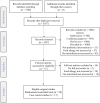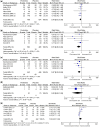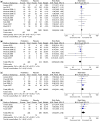Probiotics supplementation during pregnancy or infancy on multiple food allergies and gut microbiota: a systematic review and meta-analysis
- PMID: 38502006
- PMCID: PMC11723154
- DOI: 10.1093/nutrit/nuae024
Probiotics supplementation during pregnancy or infancy on multiple food allergies and gut microbiota: a systematic review and meta-analysis
Abstract
Context: Probiotics show promise in preventing and managing food allergies, but the impact of supplementation during pregnancy or infancy on children's allergies and gut microbiota remains unclear.
Objective: This study aimed to assess the effects of maternal or infant probiotic supplementation on food allergy risk and explore the role of gut microbiota.
Data sources: A systematic search of databases (PubMed, Cochrane Library, Embase, and Medline) identified 37 relevant studies until May 20, 2023.
Data extraction: Two independent reviewers extracted data, including probiotics intervention details, gut microbiota analysis, and food allergy information.
Data analysis: Probiotics supplementation during pregnancy and infancy reduced the risk of total food allergy (relative risk [RR], 0.79; 95% CI, 0.63-0.99), cow-milk allergy (RR, 0.51; 95% CI, 0.29-0.88), and egg allergy (RR, 0.57; 95% CI, 0.39-0.84). Infancy-only supplementation lowered cow-milk allergy risk (RR, 0.69; 95% CI, 0.49-0.96), while pregnancy-only had no discernible effect. Benefits were observed with over 2 probiotic species, and a daily increase of 1.8 × 109 colony-forming units during pregnancy and infancy correlated with a 4% reduction in food allergy risk. Children with food allergies had distinct gut microbiota profiles, evolving with age.
Conclusions: Probiotics supplementation during pregnancy and infancy reduces food allergy risk and correlates with age-related changes in gut microbial composition in children.
Systematic review registration: PROSPERO registration no. CRD42023425988.
Keywords: children; food allergy; gut microbiota; meta-analysis; probiotics supplementation.
© The Author(s) 2024. Published by Oxford University Press on behalf of the International Life Sciences Institute.
Figures





References
-
- Warren C, Bartell T, Nimmagadda SR, et al. Socioeconomic determinants of food allergy burden: a clinical introduction. Ann Allergy Asthma Immunol. 2022;129:407–416. - PubMed
-
- Sindher SB, Long A, Chin AR, et al. Food allergy, mechanisms, diagnosis and treatment: innovation through a multi-targeted approach. Allergy. 2022;77:2937–2948. - PubMed
Publication types
MeSH terms
Grants and funding
LinkOut - more resources
Full Text Sources
Medical

